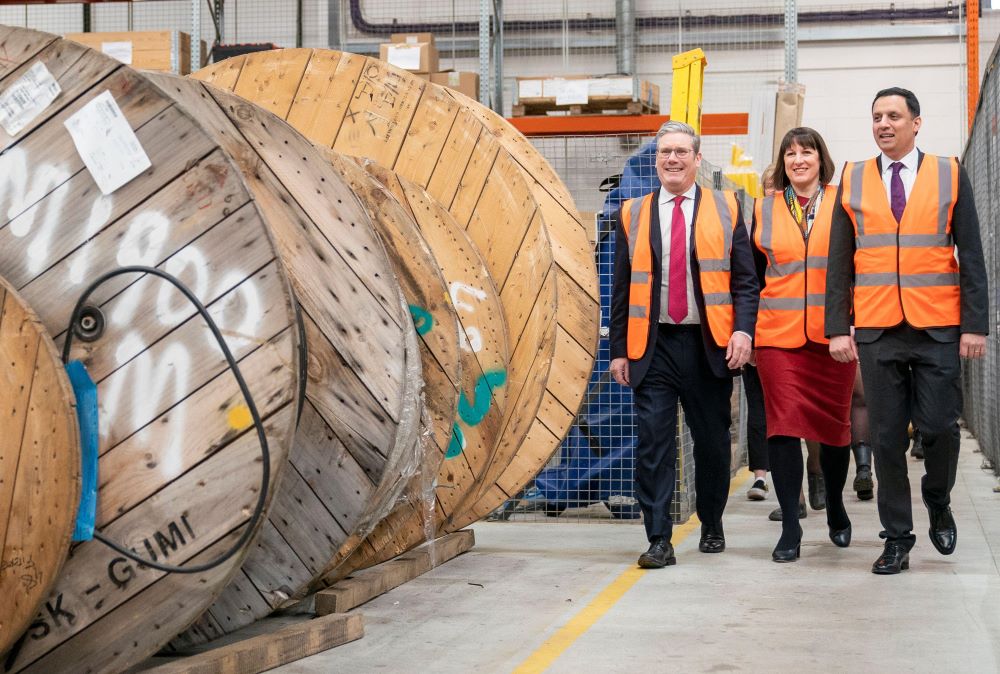Labour Believes "Tectonic Plates" For A Scottish Comeback Have Shifted
Labour leader Keir Starmer and the party's Scottish leader Anas Sarwar (Alamy)
6 min read
Confidence is growing among Labour figures that there are signs a major electoral comeback in Scotland that could be crucial to delivering an overall majority at the 2024 general election is increasingly possible.
The UK's electoral geography means it is very difficult for Labour to form an overall parliamentary majority without picking up a significant number of seats in Scotland, in addition to big wins in England and Wales. Many in Labour circles have feared that the party's collapse in Scotland a decade ago could keep them out of power – and the Conservatives in Downing Street – for a generation.
But months of upheaval in Scottish politics have changed the dynamics fundamentally.
"The story that [in Westminster] the Tories always win and Labour always lose, which the SNP have deployed very successfully, is now less true than it’s been for a long time," Douglas Alexander, a former Labour MP who held Cabinet positions in Tony Blair and Gordon Brown's governments, told PoliticsHome. "People understand that change is possible."
Labour's recent rise in overall popularity has fortuitously coincided with the chaos unleashed by financial scandal in the Scottish National Party (SNP) and reignited a belief that they could have a fighting chance north of the border when voters next go to the polls.
Since the 2014 independence referendum the SNP enjoyed an iron grip of Scottish politics under the leadership of former-first minister Nicola Sturgeon, who held onto the coalition of voters who backed leaving the UK to win successive election victories. The SNP won 50 seats at the 2015 general election, while Labour lost 40, leaving Ian Murray MP, Labour's shadow Scotland secretary, holding the party's only Scottish seat. While they clawed back six seats at the 2017 general election, Murray was once again Labour's sole Scotland survivor at the 2019 election.
Sturgeon's resignation as first minister and SNP leader and subsequent arrest sent shockwaves through Holyrood – Scotland's seat of power – as well as the rest of the UK, leaving the party in its most vulnerable position in years. Sturgeon was released without charge pending further investigation. Her successor Humza Yousaf is significantly less-known and now faces the task of replacing a hugely popular political figure and election-winning specialist, and navigating his party through a police investigation into its finances.
A few months into the fallout, there is evidence that Labour leader Keir Starmer and the party's Scotland leader Anas Sarwar are already enjoying a period of momentum.
“There’s no doubt that the Labour Party is in the most promising position in Scotland since the independence referendum," explained Sir John Curtice, Professor of Politics at the University of Strathclyde and Senior Research Fellow at the National Centre for Social Research.

Alexander, who is hoping for a parliamentary comeback by standing for Labour in East Lothian at the next election agreed that "it feels like the tectonic plates are beginning to shift, but of course there’s no room for complacency".
Labour insiders believe the party can win between 23 and 26 seats in Scotland, an outcome which could prove crucial if Starmer's party – comfortably ahead the polls – is able to form a Commons majority. The party's target seats are mostly in Scotland's Central Belt, with support for Labour weaker in more rural areas.
According to Curtice, the Labour recovery in Scotland up to now has been built on winning over unionists who had previously voted Conservative, but to continue growing ahead of the next general election it must also appeal to "soft nationalists".
While Labour is pro-union, it is hoped that some of those in favour of Scottish independence could be persuaded to switch after years of loyalty to the SNP, as a result of fatigue over the party's handling of crumbling public services. Curtice believes "soft nationalist" support is crucial because while the Tories are on a "hiding to nothing" in Scotland "like they are everywhere else", Labour has the ability to "cross" the independence divide.
Labour figures say Sturgeon's shock resignation has been a "game changer" because the SNP's domestic record is now being scrutinised in a way that hadn't been previously. One senior Labour source said the difference was "night and day", and that prior to her exit many voters were more forgiving of the SNP's record in government out of loyalty to the former first minister. They said there was an attitude of: "Nicola is trying her best and if she can't fix it, nobody can," that no longer stands.
Kirsty McNeill, a former special adviser Gordon Brown who has been selected as Labour's candidate in Midlothian, said that while Scottish voters were asking questions about the SNP's record prior to Sturgeon's resignation, the intensity of scrutiny has increased in recent months.
"The SNP government is increasingly being held to account as a deliverer of public services. We’ve finally got public policy failures as the main terrain of the debate - whether it be what people are experiencing in classrooms, in health care settings, or in police beats," she told PoliticsHome.
But Scottish Labour figures warn the party has work to do to seal the deal with new voters.
One senior figure said the party had yet to develop an "emotional attachment" with the Scottish public. Another source north of the border also worried that "the positive vote" was the challenge facing Labour between now and the next general election.
These warnings chime with a broader criticism that Starmer's Labour is too focussed on attacking the Tories, while the general public does not yet have a clear sense of what it would do in power.

The SNP is preparing to attack Starmer by claiming there is little to choose in policy terms between him and Sunak when it comes to issues like Brexit, immigration and the question of another independence referendum, and that he is part of the same problem: Westminster.
SNP MP Mhairi Black this week offered a taste of what's to come when she told PoliticsJoe Starmer's Labour and Sunak's Conservative party were "singing from the same hymn sheet".
How the battle between the SNP and Labour plays out between now and the next general election will likely be vital in determining the question of whether Starmer can lead Labour to its first majority victory in nearly twenty years, with the electoral margins in Scotland so tight.
“The important thing is that small movements between SNP and Labour can make a big difference to the outcome at a general election," explained Curtice.
"If SNP’s lead over Labour is four per cent, Labour picks up a lot of seats but if it is ten, then Labour won’t pick up much at all.
"It’s all very sensitive.”
